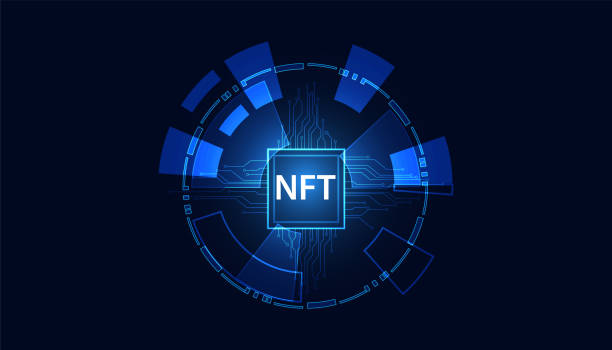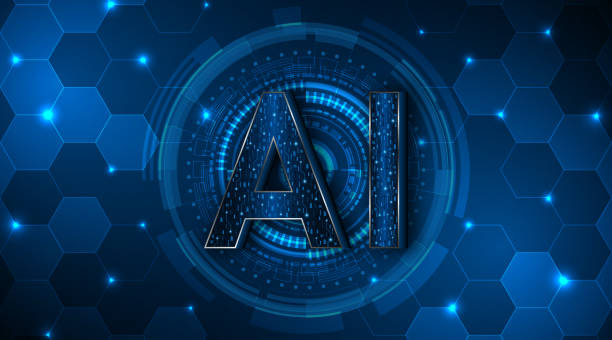What is Artificial Intelligence and How Does it Work?

#Artificial_Intelligence (AI), in short, is the imitation of human intelligence processes by machines, especially computer systems. These processes include learning (acquiring information and rules for using it), reasoning (using rules to reach a conclusion), and self-correction. Artificial intelligence is actually an effort to build machines that can do things that humans currently do. These tasks can be very simple, such as recognizing an image, or very complex, such as driving a car.
Artificial intelligence has various branches, each focusing on a specific aspect of intelligence. Some of the most important of these branches are Machine Learning, which allows machines to learn from data without explicit programming, Natural Language Processing (NLP), which allows machines to understand and generate human language, and Computer Vision, which allows machines to see and interpret images. Artificial intelligence is rapidly advancing and has the potential to impact almost every aspect of our lives.
Are you tired of losing business opportunities due to not having a professional company website?
Rasaweb helps you with professional company website design to:
✅ Build a powerful and reliable image of your brand
✅ Turn website visitors into loyal customers
⚡ Get a free consultation right now!
A Brief History of Artificial Intelligence

The idea of artificial intelligence goes back decades, but it was first introduced as a scientific discipline in the 1950s. Alan Turing, a British mathematician, posed a fundamental question by presenting the Turing Test: Can machines think? This question initiated extensive research in the field of artificial intelligence.
The 1960s and 1970s witnessed significant advances in artificial intelligence, but hardware and software limitations slowed these advances. In the 1980s, with the emergence of Expert Systems, interest in artificial intelligence was revived. Expert systems were computer programs that simulated the knowledge of human experts in a specific field. However, expert systems also had limitations and failed to meet expectations.
In the 2010s, artificial intelligence entered a new era with the emergence of Deep Learning. Deep learning is a type of machine learning that uses artificial neural networks with many layers to learn from data. This method has achieved very good results in various fields such as computer vision, natural language processing, and speech recognition. This progress is due to the increased computing power of computers and the availability of a huge amount of data (Big Data).
Types of Artificial Intelligence and its Applications

Artificial intelligence can be divided into different types based on its abilities and performance. A common classification divides artificial intelligence into two general types: Narrow AI and General AI. Narrow AI is designed to perform a specific task. For example, a facial recognition system or a movie recommendation system are examples of narrow AI. Strong AI is a type of artificial intelligence that can do anything that a human can do. Strong AI is still in the research and development stage and has not yet been fully realized.
Artificial intelligence is currently used in various fields. In medicine, artificial intelligence is used for disease diagnosis, drug design, and personalized treatments. In industry, artificial intelligence is used for process automation, quality control, and failure prediction. In finance, artificial intelligence is used for fraud detection, risk management, and personalized financial services. In transportation, artificial intelligence is used for autonomous vehicle driving, route optimization, and traffic management. These are just a few examples of the widespread applications of artificial intelligence.
The table below provides some of the key applications of artificial intelligence along with a brief description:
Machine Learning and its Role in Artificial Intelligence

Machine Learning (ML) is one of the most important branches of artificial intelligence. Machine learning allows machines to learn from data without explicit programming. In fact, machines use different algorithms to identify patterns and relationships in the data and use these patterns for prediction or decision-making.
There are different types of machine learning algorithms, including Supervised Learning, Unsupervised Learning, and Reinforcement Learning. In supervised learning, the machine learns using labeled data. For example, to train an image recognition system, you can use a set of labeled images, where each image specifies the type of object in it. In unsupervised learning, the machine learns using unlabeled data. In reinforcement learning, the machine learns by trial and error. In this case, the machine performs a series of actions and, based on the feedback it receives, learns which actions yield the best results.
Machine learning has played a very important role in the advancement of artificial intelligence. Many advanced artificial intelligence systems use machine learning algorithms to perform their tasks.
Did you know that a weak company website loses you a lot of opportunities every day? Solve this problem forever with professional company website design by Rasaweb!
✅ Create a powerful and reliable image of your brand
✅ Attract targeted new customers and increase sales
⚡ [Get a free website design consultation]
Natural Language Processing (NLP) Understanding Language by Machine

Natural Language Processing (NLP) is a branch of artificial intelligence that allows machines to understand and generate human language. Natural language processing includes a set of different tasks, including Speech Recognition, Machine Translation, Sentiment Analysis, and Text Generation.
Speech recognition allows machines to convert human speech into text. Machine translation allows machines to translate text from one language to another. Sentiment analysis allows machines to detect emotions in text. Text generation allows machines to generate new texts.
Natural language processing has wide applications. These applications include Virtual Assistants like Siri and Alexa, Chatbots, Text Summarization Systems, and Question Answering Systems.
The Future of Artificial Intelligence Opportunities and Challenges

Artificial intelligence has a lot of potential to improve our lives. Artificial intelligence can help us perform difficult and repetitive tasks, increase productivity, and provide new solutions to complex problems. However, artificial intelligence also presents challenges.
One of the most important challenges of artificial intelligence is the issue of #employment. With increased automation of tasks by artificial intelligence, there is a possibility of job losses. To address this challenge, there is a need to invest in training and educating the workforce for new jobs that artificial intelligence creates.
Another challenge of artificial intelligence is the issue of #privacy. Artificial intelligence systems need a huge amount of data to learn. Collecting and using this data can endanger the privacy of individuals. To solve this problem, there is a need to enact laws and regulations that protect individuals’ privacy against data abuse. Artificial Intelligence can also be used in discriminatory decision making.
The Impact of Artificial Intelligence on Various Industries

Artificial intelligence has had a significant impact on various industries, making many processes more optimized, faster, and more accurate. In the healthcare sector, artificial intelligence helps diagnose diseases, develop drugs, and provide personalized treatments. For example, deep learning algorithms are able to analyze medical images with high accuracy and identify signs of disease in the early stages.
In the manufacturing industry, artificial intelligence is used to automate processes, improve quality control, and predict equipment failures. Robots equipped with artificial intelligence can perform repetitive and dangerous tasks with high accuracy and speed, while predictive failure systems can identify potential problems before they occur and prevent production stoppages. In the financial sector, artificial intelligence is used to detect fraud, manage risk, and provide personalized financial advisory services to customers.
Key Concepts in Artificial Intelligence

To better understand artificial intelligence, familiarity with some key concepts is essential. One of these concepts is the algorithm. An algorithm is a set of instructions that tells a computer how to perform a specific task. In artificial intelligence, algorithms are used to learn from data, predict, and make decisions.
Another concept is data. Data is information that machines learn from. The more data available, the better machines can learn and perform. The quality of data is also very important. Incorrect or incomplete data can lead to incorrect learning and wrong decisions.
The third concept is Neural Networks. Neural networks are models inspired by the structure of the human brain. Neural networks consist of many layers of nodes (Neurons) that are connected to each other. Each node performs a simple mathematical operation and transmits the result to other nodes. Neural networks are very suitable for learning complex patterns in data. Artificial intelligence, by combining these networks, can have a much better performance in learning.
Research shows that 80% of customers trust companies that have a professional website more. Does your current website earn this trust?
Solve the problem of customer distrust and weak online image forever with Rasaweb’s professional website design services!
✅ Create a professional image and increase customer trust
✅ Attract more sales leads and grow your business
⚡ Get a free consultation
What Skills Do Artificial Intelligence Developers Need?

Artificial intelligence developers need a combination of technical and non-technical skills to succeed in this field. Essential technical skills include:
1.
#Programming Mastery of programming languages such as Python, Java, and C++ is essential for developing and implementing artificial intelligence algorithms.
2.
#Mathematics A strong understanding of mathematical concepts such as linear algebra, statistics, and probability is necessary for understanding and developing machine learning algorithms and neural networks.
3.
#Machine_Learning Familiarity with various machine learning algorithms and the ability to select and use the appropriate algorithm to solve various problems is important.
4.
#Data_Processing The ability to collect, clean, analyze, and visualize data is essential for training and evaluating artificial intelligence models.
In addition to technical skills, non-technical skills are also very important for artificial intelligence developers. These skills include:
1.
#Problem_Solving The ability to identify and analyze complex problems and provide creative solutions to them.
2.
#Teamwork The ability to collaborate with other developers, data scientists, and domain experts to achieve common goals.
3.
#Continuous_Learning Due to the rapid pace of progress in the field of artificial intelligence, developers must constantly learn and update their knowledge.
How to Learn Artificial Intelligence?

Learning artificial intelligence can be an exciting and challenging journey. There are many resources for learning artificial intelligence, including online courses, books, articles, and practical projects. Artificial Intelligence.
Online courses are one of the best ways to start learning artificial intelligence. Platforms such as Coursera, edX, and Udacity offer a variety of courses in the field of artificial intelligence. These courses typically include instructional videos, exercises, and practical projects.
Books can also be a good source for learning artificial intelligence. There are many books in the field of artificial intelligence that comprehensively explain various concepts and algorithms. Some of these books are suitable for beginners, and others are suitable for more experienced individuals.
Scientific articles are a good source for learning about the latest advances in artificial intelligence. Scientific articles are usually published in conferences and scientific journals. To access these articles, you can use databases such as Google Scholar. But the best way to learn artificial intelligence is to do practical projects. By doing practical projects, you can implement various concepts and algorithms in practice and gain experience. To start, you can do simple projects such as image recognition or stock price prediction. Over time, you can do more complex projects. Artificial intelligence will help you. Artificial intelligence learning can be very simple.
FAQ
| Question | Answer |
|---|---|
| What is Artificial Intelligence? | It is a simulation of human intelligence in machines programmed to think like humans and mimic their actions. |
| What are the main branches of artificial intelligence? | They include machine learning, deep learning, natural language processing, computer vision, and robotics. |
| What is Machine Learning? | It is a branch of artificial intelligence that focuses on enabling systems to learn from data and identify patterns without explicit programming. |
| Give examples of artificial intelligence applications in our daily lives. | Voice assistants (such as Siri and Alexa), recommendation systems on Netflix and Amazon, self-driving cars, and facial recognition software. |
| What is Deep Learning? | It is a subset of machine learning that uses multi-layered (deep) artificial neural networks to process large amounts of data. |
| What is Natural Language Processing (NLP)? | It is a branch of artificial intelligence that focuses on enabling computers to understand, interpret, and generate human language. |
| What are some of the ethical concerns related to artificial intelligence? | They include bias in data, privacy, job losses, and liability in the event of errors. |
| What are the main benefits of artificial intelligence? | Increased efficiency, improved decision-making, automation of repetitive tasks, and discovery of complex patterns in data. |
| How is artificial intelligence used in the field of healthcare? | In diagnosing diseases, discovering drugs, analyzing medical images, and personal care for patients. |
| How do you see the future of artificial intelligence? | It is expected to continue to evolve at a rapid pace, affecting all aspects of human life, from industry to education and entertainment. |
And other advertising services of Rasa Web Advertising Agency
Smart sales automation: Professional optimization to increase sales using attractive UI design.
Smart data analysis: A fast and efficient solution for managing campaigns with a focus on marketing automation.
Smart conversion rate optimization: Designed for businesses looking to grow online through custom programming.
Smart SEO: A fast and efficient solution for digital branding with a focus on custom programming.
Smart sales automation: A combination of creativity and technology to improve SEO ranking by SEO-centric content strategy.
And hundreds of other services in the field of internet advertising, advertising consulting and organizational solutions
Internet advertising | Advertising strategy | Advertorial reports
Resources
What is artificial intelligence and how does it work?
,What is artificial intelligence and what are its applications?
, How does artificial intelligence work?
,How does artificial intelligence change the world?
? Are you looking to leapfrog your business into the digital space? Rasaweb Afarin, with years of experience in digital marketing and corporate website design, is your comprehensive solution for online growth and success.
📍 Tehran, Mirdamad Street, next to the Central Bank, South Kazerun Alley, Ramin Alley No. 6
“`




